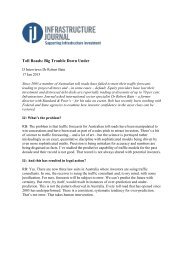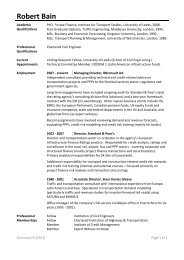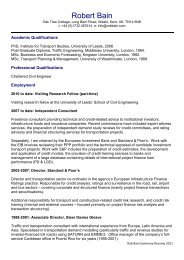Disincentivising overbidding for toll road concessions
Disincentivising overbidding for toll road concessions
Disincentivising overbidding for toll road concessions
- No tags were found...
You also want an ePaper? Increase the reach of your titles
YUMPU automatically turns print PDFs into web optimized ePapers that Google loves.
DISINCENTIVISING OVERBIDDING FOR TOLL ROAD CONCESSIONS<br />
to announce as high an upfront payment as possible, and thus to accept the highest demand <strong>for</strong>ecast. Indeed, in<br />
the case of the Intercity East Coast Line, the DfT awarded the franchise to a party that had not offered the highest<br />
payments over the lease period.<br />
Other options <strong>for</strong> enhancing the bid appraisal process, highlighted in this report, include:<br />
••<br />
reference class <strong>for</strong>ecasting;<br />
••<br />
explicit optimism bias adjustments;<br />
••<br />
separation of <strong>for</strong>ecasts into an exogenous factor, which is common to all firms, and an endogenous factor which<br />
is unique (and allows <strong>for</strong> differentiation according to individual bidders’ ability to grow traffic, as evidenced<br />
through delivery plans).<br />
These solutions all suggest that greater independent (technical) oversight is needed of parties’ bid <strong>for</strong>ecasts and<br />
submissions. 123 This could stem from stricter government guidelines on how <strong>for</strong>ecasting should be carried out and the<br />
publication of criteria with which traffic modelling should be compliant. Independent traffic and financial modellers<br />
could then be employed to carry out a third-party review as part of the evaluation process, in order to identify<br />
overambitious <strong>for</strong>ecasts and ensure that realistic traffic <strong>for</strong>ecasts <strong>for</strong>m the basis of the successful bid. Alternatively,<br />
the government could require projects to secure a specified rating from an international credit rating agency, since<br />
this would also involve the demand <strong>for</strong>ecast being subjected to greater external scrutiny.<br />
Key principle<br />
Best practice dictates that far less emphasis (if any) should be placed on any upfront premium offered by<br />
the bidders, since this merely ensures that companies are incentivised to provide high, rather than accurate,<br />
numbers. If NPV-positive, financial flows could instead be spread across the lease period. Bid appraisal should<br />
also include an assessment of the assumptions on which demand and revenue <strong>for</strong>ecasts are based, to ensure<br />
that they are well-justified and deliverable. Such approaches, in combination with many of the other best practice<br />
principles, have the potential to maintain investor confidence by ensuring that <strong>concessions</strong> are awarded to the<br />
most qualified party and <strong>for</strong> the correct reasons.<br />
5.1.5 Post-contract award<br />
In terms of contractual design, it is perhaps unrealistic to strive <strong>for</strong> complete contracts that perfectly cover all<br />
eventualities that might arise over a 30-year period. The default assumption should probably be that some <strong>for</strong>ms<br />
of renegotiation will be required over such a long time horizon—and possibly more value would result from ef<strong>for</strong>ts<br />
to ensure that effective partnering arrangements are in place to accommodate and respond to changes that are<br />
inevitable. Contractual renegotiations are usually regarded negatively when, in fact, positive (welfare-enhancing)<br />
outcomes can flow from periodically revisiting the terms and conditions governing service delivery.<br />
In short, there could be good and bad renegotiations. The situation to avoid is a <strong>for</strong>ced renegotiation with, at its core,<br />
a financially distressed project and a concession grantor feeling obliged to step in and solve the problems. Policies<br />
of, and demonstrated commitment to, no renegotiation under such circumstances are essential, but awarding<br />
<strong>concessions</strong> to the correct parties <strong>for</strong> the correct reasons goes a long way to avoid such situations arising in the first<br />
place.<br />
Key principle<br />
Best practice indicates that the Australian government’s current position of not renegotiating contracts is<br />
essentially the right one and should thus be maintained. However, consideration might usefully be given to ways<br />
in which long-term partnerships between the public and private sectors could evolve to ensure that the true spirit<br />
of partnership is maintained throughout the concession term.<br />
123 See Appendix 2 <strong>for</strong> further discussion of potential improvements to traffic and revenue reports.<br />
64






